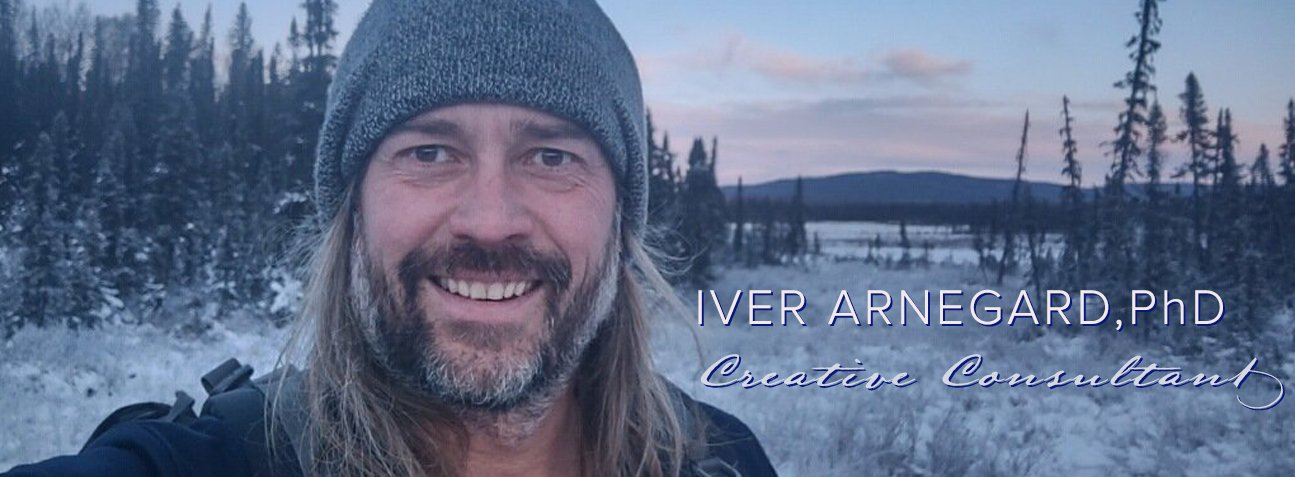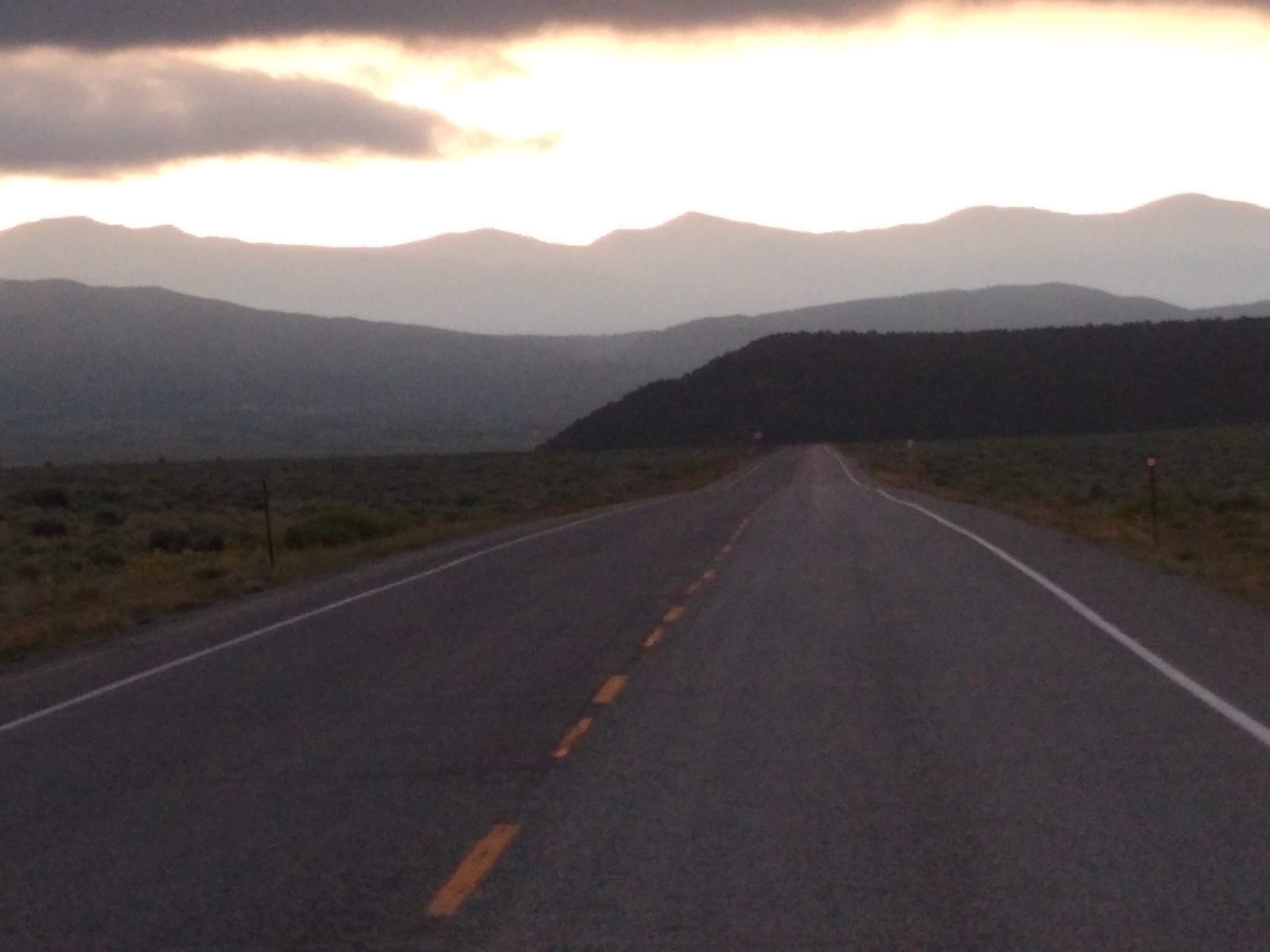Swimming with Aurora
Everyone just wants to be understood.
And you can't understand someone without listening, which a lot of people never do. Or they pretend to while they wait for their turn to talk. For twenty years I've hitched all over North America, from Alaska to New Mexico—most states and provinces in between. I’ve learned a lot in that time and it’s turned me into a listener.
When hitch-hiking there are certain rules to follow:
Always make eye contact, for one thing. And always smile. Not a huge shit-eating grin like you just swallowed a bottle of crazy pills. But a normal smile. You know what I mean.
Always keep moving. Not so much for the psychology of it—a hiker looks less destitute or unpredictable than someone standing still or stuck somewhere—but because it’s nice to walk. Good exercise. And far less mundane than standing in the same spot.
Always have everything you need with you. Tent, sleeping bag, food. I've had drivers tell me that's why they picked me up. The fact that I'm a backpacker somehow makes me less likely to be a serial killer, I guess. Once I was stranded at a gas station with a heavy duffel bag. I couldn’t carry it on my back or keep moving. And it took forever to get a ride. All day. The longest I've ever had to wait.
Stranded equals desperate which could also equal dangerous.
There are other rules, I’m sure. Ones I’m forgetting now or don’t even consciously follow myself. But, really, at the end of the day, hitch-hiking is mostly about listening. And that’s why people pick me up. Whether they realize it or not, they just want someone to talk to. Someone to listen. And maybe even understand them. I’ve been in cars and trucks with drivers as long as ten hours before and often times they never even ask where I’m from or what I do for a living. Or anything about me. And it’s not that they’re that self-absorbed. Necessarily. Though sometimes they are. But it’s usually that they just want to be heard.
My average wait in a place like Alaska is probably twenty to thirty minutes. Rarely longer. (Although when I'm on a remote highway like the Dalton it might take as long as three or four hours. But I just keep moving. It doesn’t bother me to walk indefinitely in a beautiful place.) I've talked to hitch-hikers who've been stranded all day, sometimes for days on end, and I can't understand it. I'm guessing they don't smile. Maybe they don't even face oncoming traffic or bother to make eye contact. Maybe they look pissed off or have no backpack.
Or they're just not as lucky as me.
I've had hundreds of rides over the last two decades. Maybe a thousand at this point. And I have never really felt threatened. Only been weirded out two or three times. Otherwise, my drivers have all been incredibly kind, generous, and interesting people. Some of whom I’m still in touch with.
Each one’s different. The people who pick me up hitching. But they all fall into five categories:
One: The Good Samaritan. Who see it as his or her duty, or privilege, to help anyone in need. They’re amazing people. And usually really interesting to talk to. At times, Good Samaritans have tried to convert me to their religion. Other times they don’t push an agenda at all.
Two. Teenagers looking for drugs. It usually takes them a while to get the guts to come out and ask me for some. And it’s always the same. Since I never have any I tell them, No. But good luck.
Three—Braggarts. Guys who see it as a badge of courage to pick up a hitch-hiker. They might be going to meet friends somewhere. And showing up with a hitch-hiker makes them look cool. Or so they think. One guy was talking to his girlfriend on his cell phone when he picked me up. He kept right on talking to her, even after I got in his truck. Telling her I seemed dangerous. Which is hilarious. I could hear her on the other line worrying over him. Saying he should be careful and come home to her immediately.
Category four? Other hitch-hikers. People who have been there themselves. And know what it’s like to stick their thumbs out on the side of a road. They’re the best kind of ride. And luckily one of the largest fractions, or demographics, of drivers I encounter. They’re the most comfortable rides I get. And usually the most authentic kind of people I meet.
And finally, the lonely ones…
The fifth category. Those who might be at the end of their ropes and don’t care at all about the risks of picking up hitch-hikers. The same drivers who have told me of their incurable, terminal illnesses. Their children who have died. The great loves they’ve lost. And what I’ve learned is the best thing I can do is to just listen. Which applies to every kind of driver who picks me up. But mostly this final category. The kinds of people who are usually completely alone in the world and have no one to listen to them. I feel good about these sorts of rides. Like I’m actually helping them out as much, if not more, than they’re helping me. To be heard. And understood. It’s all I really want, too. And it would only take one person.
Twenty years. Wow. Lots of rides. Lots of stories.
There was the gold-panner. Outside Whitehorse. Who steered his rusty Chevy to the side of the Alcan at dawn and handed me a bottle of whiskey before I could even say, Thanks for stopping.
The empty tour bus dead-heading back to Skagway. Just me and the driver swapping stories all night. Under a sky swimming with aurora. Shimmering with greens, reds, and purples dancing above the Mentasta Mountains.
And Leroy. The Athabaskan man who picked me up in Paxson and drove me all the way to the turn off to Manley.
“Thanks for the ride. Just hiked out of those mountains.”
“Some people,” he said, scratching the stubble on his chin as he glanced back at the peaks. “Dey get loss der.”
I paused and nodded. “Where are you headed?” I said.
“Minto. To fish camp. Whole family coming this year. Gonna we have big fun.”
We stopped in every village along the way so Leroy could say hi to one cousin or another. An aunt or uncle. Finally, north of Livengood, he pulled over to the side of the road.
“Thanks for the ride,” I said.
“Welcome.”
I yanked up on the old, rusted handle and nudged the door open with my shoulder.
“Your language,” he said to me in English as I stepped out of his truck. “Is it hard to speak?”
And I wonder who will pull over next. Someone who wants to be heard, I’m sure. Whether they realize it or not.
It’s true. Everyone just wants to be understood. I do, too. One person. And that would be the end of the line. Just one. Who says, I hear you. I’m listening.

